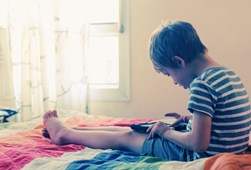At certain times of the year, family get-togethers and parties offer the perfect opportunity to catch up.
However, for children with autism who are used to routine and are likely to be hypersensitive to noise, taste, touch, smell or bright lights, the furore of a social event or gathering may prove stressful and overwhelming. There is broad scope in the sensory stimulus for children with autism, making it difficult to know how they will cope in certain situations. It's therefore important to ensure they are prepared and as comfortable as possible.
Which brings us to the question: how can a social event be made autism friendly?
Unfamiliar faces

Aunties, uncles, grandparents and cousins who may live further away, or family friends they don't come into contact with often, can cause confusion and distress to a child with autism if they aren't prepared. It may help to pin up pictures of the unfamiliar people (these could be obtained through social media) and spend some time explaining who these people are and their relation.
It can also be useful to create a countdown to any gathering or event - starting two weeks before - and continue this daily in order to prepare the child for the upcoming event. This is a fun way of making the process interactive for them too.
For the day of the event, set a place aside that the child can have as their own to remain undisturbed for an hour during the day, and explain they can have this "reward space" if they are on their best behaviour.
The idea is to make the child as prepared as possible for the challenge, and in turn create an environment in which they will feel comfortable despite the social buzz around them.
The senses
Autistic children can be hypersensitive to sensory stimulus, so the concoction of loud noises, like cheering a goal during the football or party music; new smells such as party food, and/or new sights a social gathering or party involves can upset the child. This may lead to them not wishing to be involved in what's happening and wanting to leave. These occasions are a disruption to their usual routine and the barrage of different information is sometimes difficult for children with autism to process.
Try to create a visual agenda detailing what will happen during the event, such as times things will be happening, when food is served etc, and pin this up on the wall several days in advance to prepare the child.
If there are to be games played during the party, teach the child the rules and how to play prior to the event so they can become accustomed to the format of the game. It will also be useful to create a social story to show the rules are there to make things fair and help limit the chances of a child becoming overly competitive. By doing this in a story format they will be more likely to relate and understand.
The salient point is to ensure a child with autism is prepared for what will feel an alien and potentially overwhelming environment. By readying them for what will happen during a social event or gathering the child will be in the best possible position to not only cope, but also enjoy themselves.
The National Autistic Society provides extensive information and advice for parents and carers.
For more details on how Aspris Children's Services can help to support your child, please call 0118 970 8068 or click here to make an enquiry.